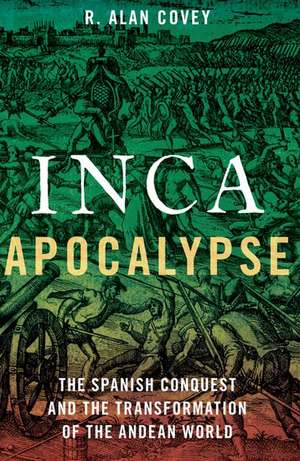Inca Apocalypse: The Spanish Conquest and the Transformation of the Andean World
Autor Alan R. Coveyen Limba Engleză Paperback – 29 iun 2023
Preț: 123.55 lei
Preț vechi: 136.29 lei
-9% Nou
Puncte Express: 185
Preț estimativ în valută:
23.64€ • 24.59$ • 19.52£
23.64€ • 24.59$ • 19.52£
Carte disponibilă
Livrare economică 14-20 martie
Livrare express 08-14 martie pentru 52.70 lei
Preluare comenzi: 021 569.72.76
Specificații
ISBN-13: 9780197655320
ISBN-10: 0197655327
Pagini: 592
Ilustrații: 25 halftones, 5 maps
Dimensiuni: 225 x 145 x 38 mm
Greutate: 0.78 kg
Editura: Oxford University Press
Colecția OUP USA
Locul publicării:New York, United States
ISBN-10: 0197655327
Pagini: 592
Ilustrații: 25 halftones, 5 maps
Dimensiuni: 225 x 145 x 38 mm
Greutate: 0.78 kg
Editura: Oxford University Press
Colecția OUP USA
Locul publicării:New York, United States
Recenzii
A compelling, readable history of the Spanish conquest of the Incas.
The latter part of Covey's fascinating book deals with the four decades it took Spain to subdue rogue invaders and independent Incas. Especially good is his discussion of crown policy towards the free state of Vilcabamba, ruled by Manco and his sons until 1572.
Overall, congratulations are in order. This is a masterful (if lengthy) synthesis of the encounter era written in a smooth, engaging, and easy style. It surpasses and complements other works, such as John Hemming'sÂThe Conquest of the Incas, published over fifty years ago, that narrate the history of the same era but without the wider geographical context and religious focus. Graduate students, archaeologists, historians, and others will benefit mightily from Covey's nuanced perspective.
Inca Apocalypse is an outstanding overview of the fall of the Inca Empire written by a world class scholar.
Inca Apocalypse is a magnificent book. Alan Covey draws on his own archaeological fieldwork to portray the rapid hegemony of the Inca Empire, stressing the role of powerful women. He then deploys massive research to give a detailed narrative of Pizarro's expeditions and conquest, decades of civil wars between the unscrupulous victors, and the Spanish Crown's and Catholic Church's strategies to control the Andean realm and its subject peoples.
Alan Covey has transformed the image of the Spanish occupation of the vast scattered domains of the Inca Empire, from a simple triumph of European technologies (and diseases), into a prolonged, and multi-faceted series of conquests that were not only military but also political, ecological, and, above all, religious. His book could well help to provide a model for a more nuanced account of European conquests in other parts of the globe.
The latter part of Covey's fascinating book deals with the four decades it took Spain to subdue rogue invaders and independent Incas. Especially good is his discussion of crown policy towards the free state of Vilcabamba, ruled by Manco and his sons until 1572.
Overall, congratulations are in order. This is a masterful (if lengthy) synthesis of the encounter era written in a smooth, engaging, and easy style. It surpasses and complements other works, such as John Hemming'sÂThe Conquest of the Incas, published over fifty years ago, that narrate the history of the same era but without the wider geographical context and religious focus. Graduate students, archaeologists, historians, and others will benefit mightily from Covey's nuanced perspective.
Inca Apocalypse is an outstanding overview of the fall of the Inca Empire written by a world class scholar.
Inca Apocalypse is a magnificent book. Alan Covey draws on his own archaeological fieldwork to portray the rapid hegemony of the Inca Empire, stressing the role of powerful women. He then deploys massive research to give a detailed narrative of Pizarro's expeditions and conquest, decades of civil wars between the unscrupulous victors, and the Spanish Crown's and Catholic Church's strategies to control the Andean realm and its subject peoples.
Alan Covey has transformed the image of the Spanish occupation of the vast scattered domains of the Inca Empire, from a simple triumph of European technologies (and diseases), into a prolonged, and multi-faceted series of conquests that were not only military but also political, ecological, and, above all, religious. His book could well help to provide a model for a more nuanced account of European conquests in other parts of the globe.
Notă biografică
R. Alan Covey is a professor of anthropology at the University of Texas at Austin, and a research associate at the American Museum of Natural History.
